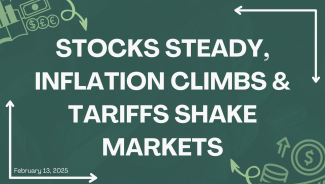
Stocks Steady, Inflation Climbs & Tariffs Shake Markets
This week, the U.S. stock market demonstrated resilience in the face of significant economic developments. The S&P 500 remained relatively stable, closing at 6,068.50, a slight increase of 2.06 points. The Dow Jones Industrial Average rose by 0.3%, ending at 44,593.65, while the Nasdaq Composite experienced a 0.4% decline, closing at 19,643.86.
A major event influencing the markets was President Donald Trump's announcement of a 25% tariff on all foreign steel and aluminum imports. Despite concerns about potential trade wars and increased costs for U.S. consumers, the market's reaction was muted. Investors appeared to interpret the tariffs as a strategic move, possibly aimed at renegotiating trade terms, rather than an immediate economic threat.
In corporate news, Coca-Cola reported robust earnings, leading to a significant rise in its stock price. The company's strong performance contributed to the Dow's gains and highlighted the resilience of consumer staples in the current economic environment.
On the technology front, Tesla's stock faced a notable decline of over 6%. This downturn was attributed to uncertainties surrounding CEO Elon Musk's potential involvement in purchasing OpenAI, raising concerns about his focus and the company's strategic direction.
The bond market also saw significant movement, with the 10-year Treasury yield experiencing its largest one-day increase of 2025. This surge followed the release of January's Consumer Price Index (CPI), which indicated a 0.5% rise, bringing the annual inflation rate to 3%. The core CPI, excluding food and energy, increased by 0.4%, reaching an annual rate of 3.3%. These figures have led investors to reassess expectations regarding Federal Reserve policies, with some speculating on potential rate hikes in the near future.
Looking ahead, the market's focus will likely remain on economic indicators and policy decisions. The recent CPI data suggests that inflationary pressures persist, which could influence the Federal Reserve's stance on interest rates. Additionally, the implementation and global response to the new tariffs will be closely monitored, as they have the potential to impact international trade dynamics and corporate earnings.
Investors are advised to stay informed about these developments and consider the potential implications for their portfolios. Diversification and a focus on fundamentally strong companies may provide resilience against market volatility stemming from policy changes and economic shifts.
As always, we welcome your questions and are here to support you. At the heart of everything we do is our commitment to "Wealth Management for Life"—providing enduring guidance for you and your family’s financial success. Whether navigating market shifts, economic policies, or investment strategies, our focus remains on helping you achieve long-term financial security and growth.

